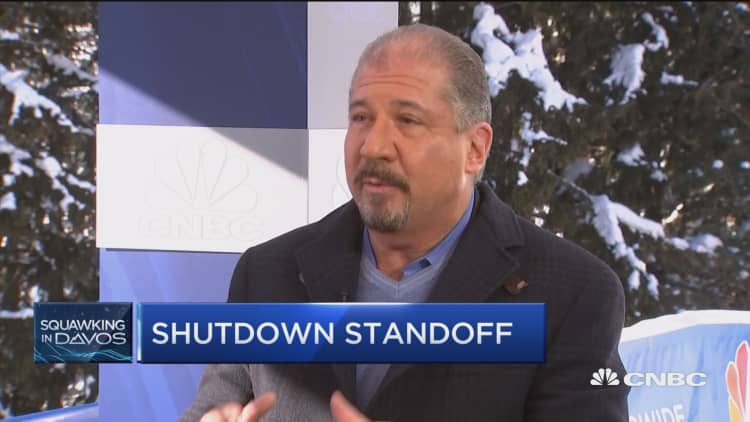
It's day 34 of the government shutdown, and both sides are standing their ground. Business leaders are warning that the longer the shutdown goes on, the bigger the economic pain on the country. This is affecting CEO and consumer optimism.
Yet EY's Global Chairman and CEO Mark Weinberger does not believe the government shutdown will have a long-term effect on GDP. The bigger issue, he says, is America's rising doubt the government will work together to pass any legislation over the next two years.
At the World Economic Forum in Davos, Switzerland, on Thursday, Weinberger told "Squawk Box" anchor Becky Quick that he's "not someone who believes it has a huge effect on GDP. It has a very humanitarian effect. I mean, I see it; my neighbors aren't getting paychecks. And we do a lot of filings with the SEC and it is slowing down IPOs, it is slowing down tax refunds. There's a real effect, but as far as reducing the GDP over the long term, I think there are much bigger issues out there."
Among them: trade. There would be a lot more money going back into Capex and a lot more supply-chain changes if it wasn't for all the uncertainty around the trade issues. Decision-making is slower. I think businesses have slowed down in moving forward with things that they otherwise would have," said Weinberger.
But, he added, "I don't see people stopping investment or stopping hiring because of these geopolitical issues."
Yet the government shutdown has had an effect on the confidence of the American people: "The real thing I think it does is undermine the confidence ... the people have in the government working together over the next two years."
If the government came to a compromise, he says the issues they should be working on are deregulation, infrastructure and appointing a number of senate seats. But, he says, "I'm not real optimistic a lot of legislation is going to get done in the next two years."
From an economic perspective, Weinberger says CEOs are less optimistic this year than last. But he is still seeing very strong fundamentals. "Businesses are still investing. It's the fifth quarter in a row of double-digit profit growth. It was up 11 instead of 17 percent. Capex is still up; hiring is obviously still up; wages are rising; net wealth for individuals is at an all-time high."
He added: "I mean, if you're pessimistic now, you're probably going to be looking for a problem. Obviously, there's more risk to the downside than we've had in a long time with all the geopolitical issues, but the underlying factors — if you're looking as a business and investing — are still very strong."







